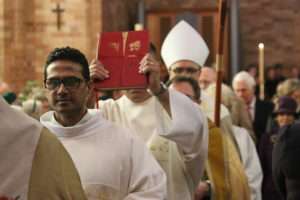Parish of Manuka, South Canberra
Services at St Paul’s, Manuka
Sunday Services

7.30 am
Eucharist / Low Mass

9.30 am
Eucharist /
High Mass

5 pm
Choral Evensong
alternating 1662 and Common Worship

9 am St David’s Red Hill
Holy Eucharist
Weekdays
Morning Prayer is said at St Paul’s Monday-Friday at 9am February – December
(except Public Holidays)
Thursdays at 10am (Feb-Dec) there is a Eucharist followed by Bible Study at St David’s Red Hill.
Our 9.30am services are regularly uploaded to our YouTube channel which can be accessed by clicking here.
Services at St David’s, Red Hill
9am Holy Eucharist Sunday
10am Eucharist on Thursdays except January
followed by Bible Study on the upcoming Sunday lections
About our Services
OUR DIFFERENT SERVICES
7.30am Said Eucharist at St Paul’s: This is a quiet, contemplative spoken service of Holy Communion. There is no singing of hymns or liturgical chant.
9am Sung Eucharist at St David’s Red Hill: This is a service of Holy Communion with hymns and sung liturgical responses.
9.30am Choral Eucharist: This service of Holy Communion features a choral mass setting which is either sung or led by one of our choirs, with hymns and liturgical chant. This service also features processions and full ceremonial on festival days. The service is preceded by half an hour of bell ringing.
5pm Choral Evensong: A contemplative and beautiful form of worship, Evensong is one of the glories of Anglican liturgical spirituality. The service is from the Book of Common Prayer and is sung by the officiating priest and choir. Celebrating the creative and expressive gifts with which humanity is endowed, particularly in musical and poetic expression, Evensong’s timeless beauty invites us to set our own prayerful thoughts and feelings under the larger canopy of the unceasing prayer of the Church throughout the centuries.
WHAT TO EXPECT
When you attend one of our services you will receive a printed order of service to follow. This contains the readings and prayers that we use during the service as well as instructions for when to stand, sit or kneel. You may be intrigued by the ways in which some worshippers cross themselves or bow their heads at certain points in the liturgy. These and other aspects of ceremonial and devotional practice are a matter of personal choice and meaningfulness. On Sunday mornings we celebrate the Holy Eucharist, also known as the Mass or Holy Communion. We keep the command of Jesus to break bread and drink wine to remember him and to experience his living presence among and within us. If you have not been baptised or have not become a communicant member of a Christian church you are welcome to come forward at the time of Holy Communion to receive a blessing from the priest instead of the bread and wine. (You may also wish to discuss with the clergy your own circumstances so that you may be admitted to receive Holy Communion either by Baptism, Confirmation or Reception into the Anglican Church.)
Our clergy wear traditional vestments during the liturgy. These are in effect symbolic uniforms that indicate the office that is being exercised and role that is being performed in a service.The colour of vestments and other decorations in the church reflects the liturgical season. The liturgical seasons help us mark the major aspects of the life of Christ and faith throughout a calendar year. The main seasons are Advent ; Christmas ; Epiphany ; Lent ; Easter. The liturgies of each season reflect their distinct theological emphases and moods. The seasons help us to live through the story of faith, and the life of Christ, anew each year. Valuing tradition doesn’t mean our worship is some sort of museum piece. While some elements of our services are traced back to the earliest centuries of Christianity, we also value the insights of contemporary creativity in our worship.
If there is anything about the service that you don’t understand or would like to know more about, please speak with the clergy and ask questions.